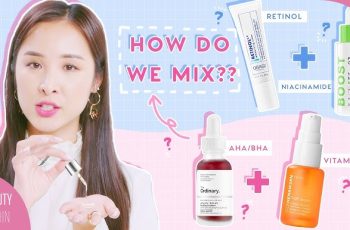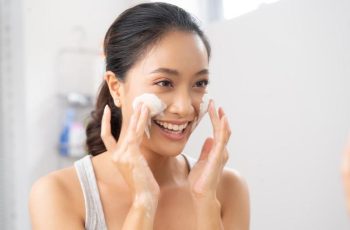
What Does a Toner Do?
There aren’t many skin care products as historic as toners. Evidence of using these scented waters in your skin care routine dates back to the 18th century. They used to be more commonly known as lotions and tonics, and their old formulas were high in alcohol. These often led to skin irritation and severe dryness. Luckily, thanks to modern technology and the discovery of chemical peels, there are a wider variety of toners to try. Those who prefer the original formulas need not worry, as they are still as popular and loved as ever.
Now that we’ve finished our skin care history lesson, let’s take a look at the toners available to you today, what they actually do for your skin, and whether they should be the latest addition to your skin care routine.
What is a Toner?
In short, toners may look like water, but they’re actually formulated with a rich blend of skin-nourishing acids, glycerin, antioxidants, and anti-inflammatory agents. When used after cleansing, they can penetrate the upper layers of the surface to hydrate the skin and remove the buildup of dead skin cells. You’ll find that toners can restore your skin to its natural acidic state, which is often imbalanced after using overly alkaline skin care products. Your pores will be cleansed and the overall look and feel of your skin will be hydrated, radiant, and plump. When the skin surface is fully functional and hydrated, any other products you apply afterwards will be absorbed into the skin quickly and you’ll find them to be more effective.
Admittedly, many of us still have misconceptions about toners and their true purpose. This is probably a result of the use of the infamous, harsh, blemish-lightening toners that were so popular in the 90s. This led to toners being considered too astringent, extremely drying, and an unnecessary step in a skincare routine. This was a common perception for many of us until recent years, when toners made a comeback on our vanities thanks to the booming Korean beauty trend. There is now a toner for everyone that can treat a variety of skin concerns, and the best part is that almost all of them are alcohol-free. Now the question is: are they really necessary to include in your skincare routine? Let’s find out more!
Are Toners Really Necessary?
Even if there is no specific skin concern that needs to be treated, everyone would benefit from incorporating a toner into their daily skincare routine, but it wouldn’t be listed as a necessary step. Here are the main benefits of toners and how they can improve your skin.
Skincare Benefits of Toner
Minimizes the appearance of pores and keeps skin clear and smooth
Soothes skin and restores pH balance
Provides protection against free radical damage
Helps remove makeup residue and impurities from the skin
Keeps skin hydrated and helps products applied to the skin absorb effectively into the underlying layers of the skin
As you can see from the list of benefits, using a toner is a great addition to any daily routine. With effective amounts of powerful skin ingredients (like glycolic acid, hyaluronic acid, and glycerin) in a toner formula, nearly all skin concerns can be addressed and the overall health and appearance of the complexion becomes balanced, healthy, and comfortable. Deciding whether or not you should include a toner in your skincare routine is entirely up to you and how you approach your skincare routine.
What happens if you use a toner every day?
This depends primarily on your skin type, but many experts recommend that it’s best to use a toner morning and night. However, once you’ve determined that a toner is right for you and your skin, you should use it twice a day. This can be easily done by doing a 24-hour patch test on the inside of your forearm. If you find that a toner causes you dryness and irritation, you should avoid it altogether or stop using it immediately.
How to Use Toner According to Skin Type
Oily Skin – Use twice daily, morning and night after cleansing the skin.
Blemish Prone Skin – Use twice daily, morning and night. Avoid overuse as this can dry out the skin and lead to further breakouts.
Dry Skin – Use once daily, evening after cleansing and before applying a nourishing skin serum.
Combination Skin – Use twice daily if the formula does not contain skin ingredients that are too harsh on dry areas of the face.
Sensitive Skin – Talk to your primary care physician or dermatologist to find the best toner for you that will not cause skin irritation.
Hopefully this clarifies how often you should use a facial toner. Remember to consider the formula and the active ingredients it contains, as this can also help you decide how often to use it. For example, facial toners with a high percentage of niacinamide and hyaluronic acid are particularly beneficial to the skin as they support moisture supply and lock it into the skin.
Do You Wash Your Facial Toner Off?
It is absolutely not necessary to wash off a toner. If you don’t allow it to absorb into your skin, you’re preventing it from working properly. Facial toners are similar to astringents or micellar toners and should be left on your skin instead of washed off. Formulas with chemical exfoliants like salicylic, glycolic, or lactic acid must be left on the skin to remove dead skin cells and maintain the skin’s natural pH balance and overall health.
Can I leave toner on my face overnight?
It’s perfectly fine to leave toner on your skin overnight. Once you’ve completed the rest of your skincare routine, you’ll find that all the other ingredients in your serum, facial oil, and moisturizer absorb quickly through toner, providing more hydration and other skin benefits that can improve your overall complexion. However, if you notice a burning or irritated sensation on your skin in the morning, it’s best to avoid using toner at night.
Hopefully today you have a better understanding of what toners do for your skin and how they can fit into your daily routine. If you’re wondering how chemical peels work in a formula, check out our blog post on chemical peels and their skincare benefits.


